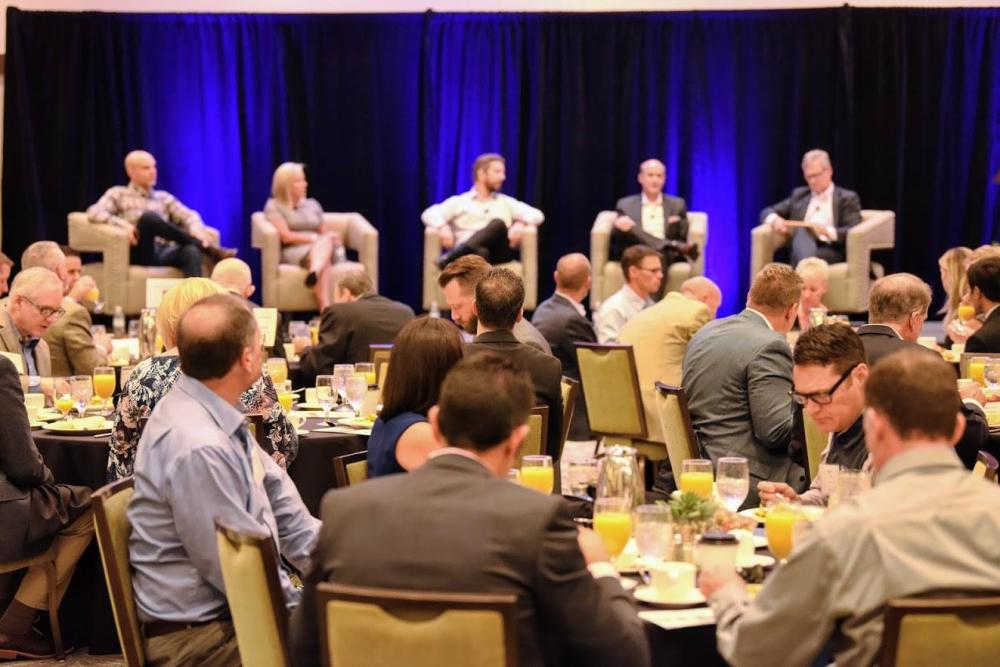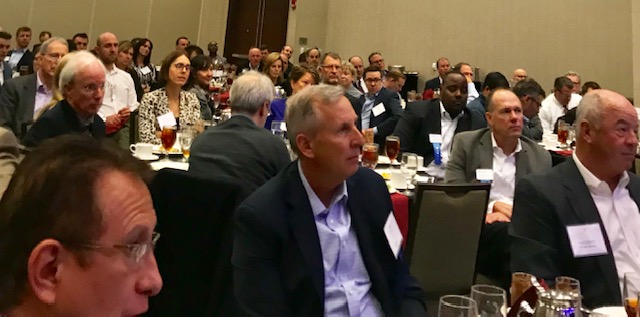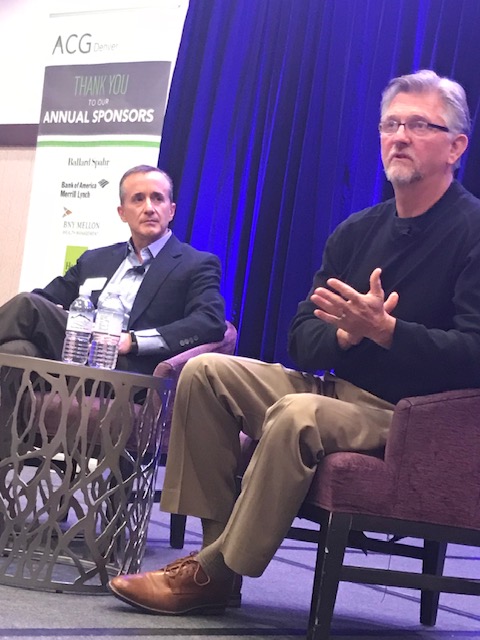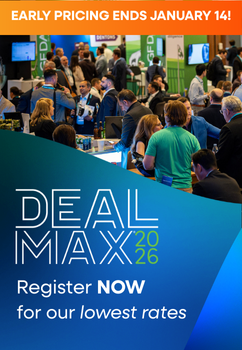
SEPTEMBER 2018 CES EVENT HIGHLIGHTS

Four Local CEOs Share Their Challenges
With humor and substance, a panel of local middle-market CEOs shared their personal experiences and strategies for growth in today’s challenging environment at ACG’s September Corporate Executive Breakfast. David Barnett, Founder and CEO, PopSockets; Carla Dore, Owner, Workplace Resource Colorado; Taylor Merritt, CEO, Merritt Aluminum Products Company; and John Oechsle, CEO, Swiftpage, spoke to a filled room on a range of issues, from attracting great talent to expanding in international markets. Kevin Brynestad, Managing Director, BKD, moderated the discussion.
Highlights from the panelists’ stories
David Barnett, Founder & CEO, PopSockets (Boulder)
It’s hyper-scaled growth, from Boulder to the world.
David Barnett was a philosophy professor before becoming an accidental entrepreneur in 2010. It began with his frustration with earbud cords tangling up in his pockets and getting in his way. After being laughed out of wearing his makeshift fabric and button solution by family and friends, the newly designed PopSocket grips were born with a Kickstarter campaign in 2014. In their first year of business, the company sold 30,000 of the little mobile phone accessories in the U.S. Last year they sold 35 million in 50-plus companies around the world, and this year they’re on track to reach the 50 million mark.
Barnett’s biggest initial challenge was his lack of experience in the business world, which extended to his team, who were recently out of college. They didn’t know the way to meet the growing demand and were turning away business as a result. As soon as they accumulated some money, they hired experts. They knew success was all about hiring the right people. Barnett realizes that their future growth will never match the speed of growth of their first few years, and it will be more in international markets than in the U.S.
Potential customers include anyone in the world with a smart phone. PopSockets maintains multiple overseas offices, with about the same number of employees in the U.S. and abroad. Most of their competition is in counterfeits, and the companies that make them are their biggest problem, amplified by the online market. Every day, they remove one to two thousand counterfeit units from stores. PopSocket grips cost $10; counterfeit products go for $2. People go for the fakes.
PopSockets uses a combination of offense and defense in moving into new markets before the competition gets there. Their offense is creating brand awareness; their defense is protecting their brand. The company has hired a staff to manage their defense, and they work with 45 law firms and investigators around the world.
Barnett says that he overestimated the difficulty of getting into some markets, especially when companies making counterfeits arrive first. This makes it more difficult to expand internationally. The company is aggressive in defending its markets. They are currently shutting down all production in China; they’ve been successful in obtaining copyrights all over the world; and they litigate regularly. It’s war. They often take distribution back from major distributors. Since PopSocket grips are a whole new category, they can’t use the brand equity of other companies, such as distributors, to build new markets. http://popsockets.com/
Carla Dore, Owner, Workplace Resource Colorado (Denver)
Everything is geared toward untethering people from their desks to work in open spaces.
Workplace Resource Colorado is a HermanMiller certified dealer and partner in creating meaningful workplace environments through office design, furniture, architectural products, technology integration, and more to diverse businesses in Colorado and Wyoming. The company employs just under 100 people. Carla Dore was hired 28 years ago, stepping onto the bottom rung of her career ladder after college and working her way up to owner.
Over the past few years, workplace design has completely changed. Companies want people to stay at work throughout the day, and they want environments that are more thoughtful and foster collaboration. Everything is geared toward untethering people from their desks and working in open spaces. The look of office furniture has changed widely. This means that Workplace Resource has to be agile and anticipate what clients might see as problems. They need to figure that out in order to grow the business, and that has created challenges.
Much of their growth since 2011 has meant expanding the services part of the business, including architecture, technology, moving, and “encore” services, which enable them to handle the full gamut of client needs “before, after, above, and beyond” a move or other change. Dore emphasized that they couldn’t have expanded successfully without the critical support of research-driven HermanMiller and its high quality products.
In looking for areas to expand, they found that many things have grown smaller. For example, as companies trend toward more openness, cubicles have given way to benching stations that accommodate more people, and cost less. The 8x6 workstations of the past used to cost about $5k per seat; benching stations cost just $1k per seat, a big hit to the bottom line. On the other hand, many clients do business worldwide, which means shipping furniture all over the world for them. Cultures in other countries add to the challenge of serving clients doing business internationally, and Workforce Resource is already busy in Colorado and Wyoming. Sometimes they have to give up the business in order to do what’s good for the client if that client needs international service. International furniture sales are very complex, and need to be serviced on site. It’s super complicated to offer their range of services on a worldwide basis.
A major challenge for Workplace Resource is sourcing talent. With the low unemployment rate in Colorado, it’s difficult to find the wide range of skills and talent they need as they expand their services to everything from offloading trucks to sales, customer service and other areas. Finding skilled labor is the most difficult challenge. In addition to advertising on Indeed, their hiring strategies include negotiating with candidates, working with communities to establish apprentice programs, working with colleges and universities, contacting firms with opportunities, and old-fashioned word of mouth. With all of that, they believe they can do better by being more creative. Lots of kids can do a good job with the right opportunity. A number of their employees are like her—they started at the bottom and have stayed 20 or more years with the company. That speaks well of their own work environment. http://www.wrcolo.com/
Taylor Merritt, CEO, Merritt Aluminum Products Company (Ft. Lupton)
CEOs all say talent is their biggest issue.
Merritt Aluminum Products was originally part of a family business started by Taylor’s grandparents in 1951 in Portland, Oregon. They produced trailers for agribusiness to carry livestock and commodities. Two years ago, they dissolved the legacy business to form two separate companies. Taylor Merritt became the CEO of Merritt Aluminum Products Company, whose core business is producing accessory products for heavy-duty trucks.
Merritt pointed out that because the company produces their products out of aluminum, it’s easy for them to expand the business to other industries. Their products are premium-priced and high quality. Materials are primarily sourced domestically, which limits the spectrum of supply chain opportunities. Instead, they have established close relationships with U.S. suppliers, including a primary relationship with a source in Texas.
Inhibiting this growth potential is recruiting and retaining the skilled talent they need. They are growing fast and the workforce issue is their number one challenge. In talking with other CEOs every day, Merritt finds that talent is the biggest issue for virtually all of them. Historically, their mindset has been “build and they will come,” but that doesn’t cut it anymore. Their efforts to resolve the problem include becoming more proactive by casting a wider net and hitting it from every possible angle, along with focusing on a positive culture to attract talent. In specifically attracting people with the right skills, they advertise on line, have an employee referral plan, and reach out to local community colleges in Colorado to collaborate with designing in-school training that creates a pipeline of people taught their specific skill needs.
Trade and tariffs are a second major issue for the company, and the current environment is like a roller coaster after constraints were put on their pipeline last fall, driving pressure on pricing. Merritt expects supply delays, increased prices, increased ramp-up times, and multi-year cycles for building new plants to continue for the near future, making it difficult to get product out and transport it to warehouse in the U.S. The situation is political, with no easy answer on how to simplify the market. http://merrittproducts.com/
John Oechsle, CEO, Swiftpage (Denver)
International expansion requires that you look at a ton of factors in every country.
Swiftpage offers software and services to meet the unique needs of small businesses. The ACT! CRM pack is their main product. The company was founded in 2001 by Bob Ogden. John Oechsle was an investor in the company and became CEO in 2012. He quickly acquired ACT! and Saleslogic from Sage, combining integrated marketing and CRM solutions. Oechsle described the process as a “wild ride and lots of fun.”
Since 2002, the company has gone through three stages. The first stage was about getting software to emerging companies like Constant Contact and other email solutions companies and embedding it in their products. Initially they chose to work with Sage and choked after being unable to replicate the success they created with them. The second stage was growth: establishing their brand, creating leads, and winning customers. The goal was to own the process of conversion and retention. Currently in stage three, their anchor product is ACT! which has led to achieving their place as a major player in the market. The plan is to stay on the acquisition path to growth. More than anything else, success depends on having a strong and articulate strategy that everyone understands.
Swiftpage operates in several foreign markets, currently looking to expand in Latin America. International expansion requires that you evaluate many factors in each country. Oechsle’s experience living in various countries around the world gives him perspective on what international growth requires. He believes that you have to pick and choose where you want to go and understand why you make the choice you do, especially whether the country helps meet your strategy. Unlike many other companies expanding abroad, Swiftpage looks for countries that offer good locations and talent, rather than focusing on things like tax breaks. They often partner with a local distributor company for two to three years; and if it works they acquire them. Sometimes it’s better to build a new location from scratch. Every country is different and needs to be evaluated individually from both regulatory and culture perspectives.
Integrating cultures is a major challenge, especially when it’s between different foreign companies. You can’t force your culture on another company. As example, Oechsle explained that “Swifties” are used to what could be described as a typical California workplace environment, with long hours and many perks. That caused difficulties for the Brits, used to working 37 hours a week. There are certain workforce differences that you have to respect. The very first person Oechsle hires when they move into a foreign country is a really good HR person who knows the country and culture. Another piece of advice: You can’t predict what’s going to happen in the world. You shouldn’t get so involved in one country that you could be brought down. Diversify your expansion overseas. http://swiftpage.com/


Thank you to our 2018 Corporate Executive Series Sponsors:


Register by January 14 to lock in the lowest rate and join 3,200+ dealmakers in Las Vegas on April 27-29, 2026.
